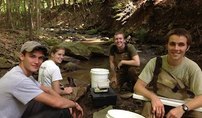Scientists Use Crowdfunding to Pay for Fracking Research
-
Susan Phillips

courtesy of Chris Grant
Students from Juniata College collect aquatic life samples in streams as part of a study to determine potential impacts of fracking.
You’ve heard of Kickstarter, the website that allows everyone from budding filmmakers to student dancers, to nail polish designers, search for individual funders over the internet. Now, there are crowdfunding websites popping up that focus on scientific research. Two Juniata College professors are turning to one of these to fund their fracking research. Micro-biology professor Regina Lamendella and ecologist Christopher Grant, want to find out how fracking for Marcellus Shale gas impacts stream life in Northcentral Pennsylvania. So they’ve put up a video and a description of their project on iamscientist.com. Lamendella and Grant, along with their students, will be collecting samples of bacteria, micro-invertabrates, macro-invertabrates, and fish from 26 headwater streams this summer. Some of those streams have already been contaminated through frack water spills. Others are near gas drilling operations, and there will be some in areas where fracking has yet to begin.
Using iamscientist.com, they plan to raise $10,000 by May 1. Typically academic researchers seek grants from private foundations, or public sources. But Lamendella says using crowdfunding is more efficient.
“Crowdfunding gives you the opportunity to get started right away,” says Lamendella. “In 30 or 60 days you can meet your goal. The traditional method [of writing grants] takes a year. We also want to get the community invested in science that interests them.”
Lamendella says one of the most exciting things about the project is that people who aren’t scientists, but whose lives will be directly impacted by the research, have donated to the project.
“I’ve gotten great feedback,” says Lamendella. “The negative feedback I’ve gotten is [from people who say our] video is too high level [they] don’t know what’s going on.”
Lamendella says she and Grant plan to re-do a video without scientific jargon that can explain what it is they’re doing out in the field, and how it will help them determine the impacts of fracking.
So far, after three weeks online, the project has raised $3,245 from 46 individuals and organizations.
“They’re coming from all over,” says Lamendella, “from California, from a troop from Iraq, Washington, D.C. Half are from Pennsylvania, and some are from organizations like sportsmen’s clubs.”
She says she hasn’t gotten any donations from oil and gas companies.
“From our standpoint, we’re probably the most unbiased,” she said. “We’re just this little college interested in the science. We don’t know whether the research will reveal a detrimental impact or not.”
Lamendella plans to use DNA sequencing to find out what is happening to microorganisms as a result of gas drilling. Since the area of their research is currently pristine, she says any change would likely be due to gas drilling.
“Nothing else is going on out there,” she says. “So I don’t know what else would be doing it.”
Scientists usually do their painstaking data collection research without interaction with the public. But crowdfunding scientific research could change that.
“The unique thing about it is connecting to other people,” says Lamendella. “I didn’t know about all these sustainability clubs that are out there. It connects you to people you would otherwise never known about.”
Lamendella says some samples were gathered last summer by students. The project has already received funding from the National Fish and Wildlife Service and the Colcom Foundation.
















